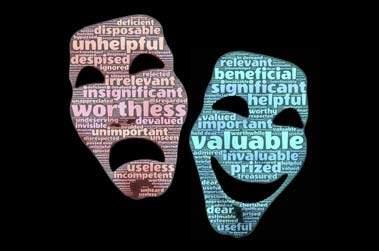Ce nouveau cours d’anglais, élaboré par Virginia Allum, auteur et consultante EMP (English for Medical Purposes) traitent des pathologies mentales et de comment les évaluer. Les corrigés des exercices sont à retrouver en PDF en bas de page.
N'hésitez pas à vous servir du dictionnaire en ligne Wordreference. Vous trouverez à la fin de cet article les corrections des exercices qui vous sont proposés téléchargeables au format pdf.
Activity 1
Match the English term with the correct French translation.
| 1. mood | a) labile |
| 2. blunt affect | b) euphorique |
| 3. flat affect | c) humeur |
| 4. athymia | d) perspicacité |
| 5. agitated | e) hallucination auditive |
| 6. premorbid personality | f) délire |
| 7. euphoric | g) automutilation |
| 8. labile | h) athymie |
| 9. delusions | i) la personnalité du sujet avant sa maladie |
| 10. auditory hallucination | j) affect abrasé |
| 11. insight | k) perturbé |
| 12. self-harm | l) affect émoussé |
Activity 2
Match the terms with their definitions. Select terms from the box below.
- affect
- delirium
- dementia
- EEG
- insight
- misuse
- mood
- MMSE
- MRI
- non-judgemental
- _______________ : type of imaging which gives information about tissues in the body
- _______________ : loss of mental ability, most often seen in the elderly
- _______________ : a person’s awareness of their own behaviour
- _______________ : tracing of the electrical impulses of the brain
- _______________ : outward expression of a person’s emotions
- _______________ : not making comments which might reflect a person’s own ethics
- _______________ : a person’s emotions which influence their daily life
- _______________ : short test which evaluates a person’s ability to think clearly
- _______________ : improper use of something, e.g. drugs
- _______________ : type of mental confusion which happens quickly
Activity 3
What is the difference? Match the terms with their correct meanings.
The term hallucination (to hallucinate) comes from a Latin word alucinatus meaning wander in the mind, ramble in thought. A hallucination is a sensory impression which is not based on fact, that is, a person may see something which appears real, but is an illusion.
| 1. auditory hallucination | a) feeling something which is not there, e.g. insects crawling on the skin |
| 2. visual hallucination | b) perception of taste, often unpleasant without the ingestion of food |
| 3. gustatory hallucination | c) hearing sounds or voices which are not there |
| 4. olfactory hallucination | d) bizarre sensations experienced between a sleeping state and wakefulness |
| 5. tactile hallucination | e) experience of pleasant or unpleasant phantom smells |
| 6. hypnopompic hallucination | f) seeing colours, objects or lifelike images |
Activity 4
Read the text and answer the questions.
The evaluation of patients with psychiatric disorders is multifaceted and best undertaken by the Mental Health Team. The holistic assessment of patients includes a review of the physical, psychological, social and spiritual aspects of an individual. A physical examination is important, so that conditions whose symptoms mimic psychiatric disorders can be ruled out. For instance, elderly patients who present with sudden delirium can be misdiagnosed as having dementia, when they are suffering from an acute urinary tract infection. A complete physical examination may also include laboratory tests as well as MRI (magnetic resonance imaging) and EEG (electroencephalogram). Psychological testing includes mental status examination which checks a patient’s mood and affect, as well as a patient’s insight and judgement. A Mini-Mental State Examination (MMSE), a short questionnaire with a maximum score of 30 points, may be administered to assess a patient’s cognitive impairment in order to diagnose dementia. The test covers aspects of orientation to time and place, recall of facts and simple calculations.
Sometimes nurses have to ask difficult questions during history taking. Questions about drug misuse can be framed as What drugs are you taking at the moment?
instead of the more direct question, Do you take drugs?
which can be more confronting. Similarly, questions about a patient’s sexual history need to be asked tactfully and in a non-judgemental manner.
- Mental Health assessment must include physical and psychological evaluation, because…
a) assessments should be holistic and comprehensive
b) some physical conditions have similar symptoms to psychiatric disorders
c) Mental Health disorders have many different symptoms which need reviewing - Delirium can be mistaken for dementia, because…
a) patients exhibit significant confusion in both disorders
b) many elderly people suffer from both delirium and dementia
c) delirium is a symptom of dementia - During the Mini-Mental (MMSE), participants complete a questionnaire which …
a) evaluates how well a person can do simple maths questions
b) tests a person’s long and short-term memory
c) shows how well they are able to think and remember facts - If nurses ask sensitive questions in a non-judgemental manner, patients …
a) will not become angry or agitated
b) may talk openly about their situation
c) may talk honestly about illicit drugs
Téléchargez les corrections au format PDF
Virginia ALLUM Author and Consultant in English for Medical Purposes



REFONTE DE LA FORMATION
L'idée d'un tronc commun en master hérisse les infirmiers spécialisés
ÉTUDES
D’infirmier à médecin : pourquoi et comment ils ont franchi le pas
VIE ÉTUDIANTE
FNESI'GAME : l'appli qui aide les étudiants infirmiers à réviser
PRÉVENTION
Des ateliers pour préserver la santé des étudiants en santé